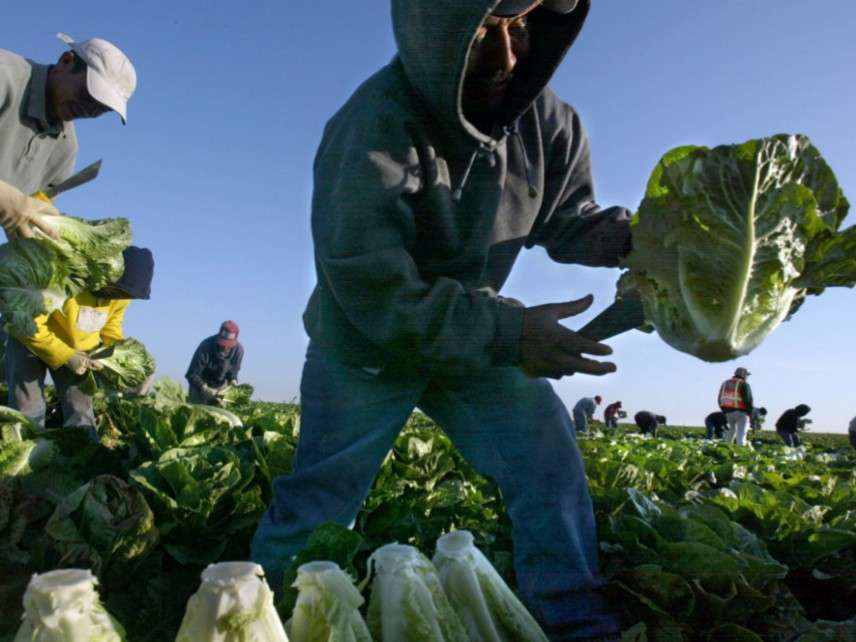Lettuce and Beef Recalls Show Food Safety Rules Can't Make Us Perfectly Safe All the Time
Despite the recent recalls, America's food supply is remarkably safe. But it's not now, and likely won't ever be, perfectly safe.

This holiday season has not been a good one for food safety regulators.
In December, a months-old recall of salmonella-tainted ground beef (that initially passed USDA inspection) was expanded to include more than 12 million pounds. And widespread contamination of romaine lettuce caused the Centers for Disease Control to take the unusual step of warning Americans not to eat any romaine whatsoever.
Since the romaine outbreak began began two months ago, more than 50 people across the country have been sickened by eating lettuce contaminated with E. coli, a potentially deadly bacteria, according to reports. Those same reports indicate the tainted romaine was grown in California.
These recent events have shone a new light on the failure of much ballyhooed regulations to improve food safety in America.
Nearly eight years ago, the Food Safety Modernization Act (FSMA) was signed into law. The food safety law has been heralded as the most important food law in 80 years. It was intended to prevent, among other things, contaminated lettuce from showing up at our grocery stores.
While the law contained several provisions—such as one that pertains to the safety of pet food—two key provisions of the law were intended to improve food safety practices of domestic farmers and food producers. FSMA's produce rule, which covers lettuce and other crops, governs irrigation, fertilization, livestock and wild animals, worker hygiene, and facilities.
"For farmers, the law requires the FDA, the federal agency in charge of enforcing the law, to 'establish science-based minimum standards for the safe production and harvesting of fruits and vegetables,'" I describe in my recent book, Biting the Hands that Feed Us: How Fewer, Smarter Laws Would Make Our Food System More Sustainable.
"For other food producers—from makers of fresh pasta sauce to Greek yogurt—the law orders the FDA to require food manufacturers to have in place a written plan for preventing transmission of pathogens that could cause foodborne illness."
Predictably, the recent nationwide food recalls have led some to call for even stricter food-safety regulations.
The empty lettuce shelves Americans have seen at our local groceries, a Minneapolis Star-Tribune editorial last week suggested, "show just how much work lies ahead to modernize the nation's food safety laws." In 2010, those same editors hailed FSMA as a "a critical step toward making the U.S. food supply safer."
The Star-Trib editors note, correctly, that full implementation of FSMA has been delayed. That happened several times under President Obama and, more recently, under President Trump. Criticizing those delays as an obstacle to safer food sounds reasonable. After all, according to the FDA, foodborne illness is a "largely preventable" problem. But FSMA never has been, nor will it ever be, a tool for preventing more than a sliver of those illnesses. The FDA's own best-case scenario for improving food safety under these two key rules, I write in my book, is "just a 2.6 percent reduction in total foodborne illness cases."
That said, basic food safety rules aren't the enemy. One power granted the FDA by FSMA that I've long supported is the authority to order mandatory recalls of tainted foods. That authority—which the FDA always claimed it didn't want—has had a positive impact on food safety, including during the current outbreaks of foodborne illness.
Despite the recent recalls, America's food supply is remarkably safe. That's due to a combination of business practices, consumer demands, the threat of litigation, and—yes—regulations. But the stricter rules the FDA and others promised would make our food supply much safer under FSMA weren't even designed to do so. And that's OK. We can make the world safer, but we'll never make it completely safe. Some dirty lettuce and ground beef shouldn't lead us to layer on more regulations in pursuit of an unachievable goal.


Show Comments (102)